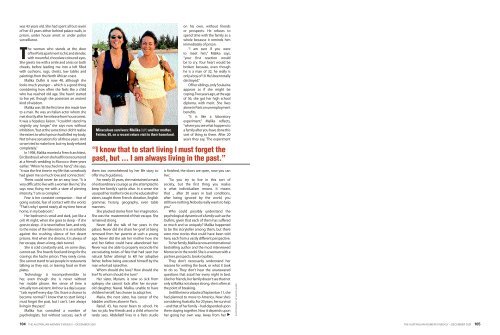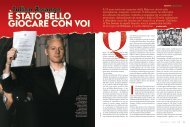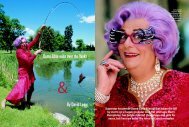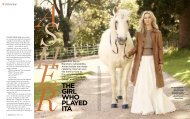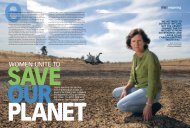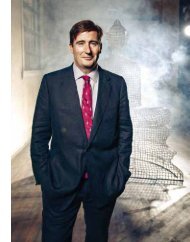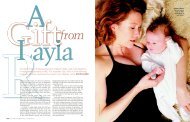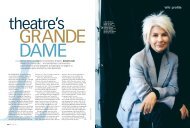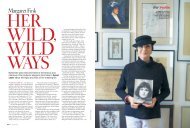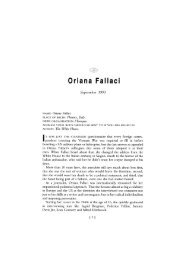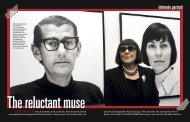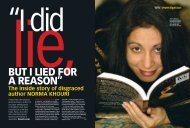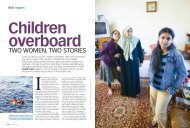Read Article - David Leser
Read Article - David Leser
Read Article - David Leser
You also want an ePaper? Increase the reach of your titles
YUMPU automatically turns print PDFs into web optimized ePapers that Google loves.
was 43 years old. She had spent all but seven<br />
of her 43 years either behind palace walls, in<br />
prison, under house arrest or under police<br />
surveillance.<br />
The woman who stands at the door<br />
of her Paris apartment is chic and slender,<br />
with mournful, chocolate coloured eyes.<br />
She greets me with a smile and a kiss on both<br />
cheeks, before leading me into a loft filled<br />
with cushions, rugs, chests, low tables and<br />
paintings from the North African coast.<br />
Malika Oufkir is now 48, although she<br />
looks much younger – which is a good thing<br />
considering how often she feels like a child<br />
who has reached old age. She hasn’t started<br />
to live yet, though she possesses an ancient<br />
kind of wisdom.<br />
Malika was 38 the first time she made love<br />
to a man. He was an Italian actor whom she<br />
met shortly after her release from house arrest.<br />
It was a hopeless liaison. “I couldn’t stand my<br />
virginity any longer,” she says now without<br />
inhibition, “but at the same time I didn’t realise<br />
the extent to which prison had killed my body.<br />
Not to have sensations for all those years. And<br />
so we tried to make love, but my body refused<br />
completely.”<br />
In 1998, Malika married a French architect,<br />
Eric Bordreuil, whom she had first encountered<br />
at a friend’s wedding in Morocco three years<br />
earlier. “When he touched my hand,” she says,<br />
“it was the first time in my life that somebody<br />
had given me so much love and connection.”<br />
Theirs could never be an easy love. “It is<br />
very difficult to live with a woman like me,” she<br />
says now, fixing me with a stare of piercing<br />
intensity. “I am so complex.”<br />
Fear is her constant companion – fear of<br />
going outside, fear of contact with the world.<br />
“That’s why I spend nearly all my time here at<br />
home, in my bedroom.”<br />
Her bedroom is small and dark, just like a<br />
cell. At night, when she goes to sleep – if she<br />
goes to sleep – it is never before 3am, and only<br />
to the noise of the television. It is an antidote<br />
against the crushing silence of her desert<br />
prisons. And when she dreams, it is always of<br />
her escape, down a long, dark tunnel.<br />
She is cold constantly and, on some days,<br />
cannot eat. She hoards food and longs for the<br />
cravings she had in prison. They rarely come.<br />
She cannot stand to see people in restaurants<br />
talking as they eat, or leaving food on their<br />
plates.<br />
Technology is incomprehensible to<br />
her, even though she is never without<br />
her mobile phone. Her sense of time is<br />
virtually non-existent. An hour is a day is a year.<br />
“I ask myself every day: ‘Do I have a chance to<br />
become normal?’ I know that to start living I<br />
must forget the past, but I can’t. I am always<br />
living in the past.”<br />
Malika has consulted a number of<br />
psychologists, but without success, each of<br />
104 THE AUSTRALIAN WOMEN’S WEEKLY – DECEMBER 2001<br />
Miraculous survivors: Malika (left) and her mother,<br />
Fatima, 65, on a recent return visit to their homeland.<br />
them too overwhelmed by her life story to<br />
offer much guidance.<br />
For nearly 20 years, she maintained a mask<br />
of extraordinary courage as she attempted to<br />
keep her family’s spirits alive. In a sense she<br />
usurped her mother’s role as she educated her<br />
sisters, taught them French dictation, English<br />
grammar, history, geography, even table<br />
manners.<br />
She plucked stories from her imagination.<br />
She was the mastermind of their escape. She<br />
remained strong.<br />
Never did she talk of her years in the<br />
palace. Never did she share her grief at being<br />
removed from her parents at such a young<br />
age. Never did she ask her mother how she<br />
and her father could have abandoned her.<br />
Never was she able to properly reconcile the<br />
excruciating twists of fate that had seen her<br />
natural father attempt to kill her adoptive<br />
father, before being executed himself by the<br />
man who had raised her.<br />
Whom should she love? How should she<br />
live? To whom should she turn?<br />
Her sister, Myriam, is now so sick from<br />
epilepsy she cannot look after her six-yearold<br />
daughter, Nawal. Malika, unable to have<br />
children herself, has chosen to adopt her.<br />
Maria, the next sister, has cancer of the<br />
bladder and lives alone in Paris.<br />
Raouf, 43, has never been to school. He<br />
has no job, few friends and a child whom he<br />
rarely sees. Abdellatif lives in a Paris studio<br />
on his own, without friends<br />
or prospects. He refuses to<br />
spend time with the family as a<br />
whole because it reminds him<br />
immediately of prison.<br />
“I am sure if you were<br />
to meet him,” Malika says,<br />
“your first reaction would<br />
be to cry. Your heart would be<br />
broken because, even though<br />
he is a man of 32, he really is<br />
only a boy of 10. He’s been totally<br />
destroyed.”<br />
Of her siblings, only Soukaina<br />
appears as if she might be<br />
coping. Two years ago, at the age<br />
of 36, she got her high school<br />
diploma, with merit. She lives<br />
alone in Paris on unemployment<br />
benefits.<br />
“It is like a laboratory<br />
experiment,” Malika reflects,<br />
“where you see what happens to<br />
a family after you have done this<br />
sort of thing to them. After 20<br />
years they say, ‘The experiment<br />
“I know that to start living I must forget the<br />
past, but ... I am always living in the past.”<br />
is finished, the doors are open, now you can<br />
live.’<br />
“So you try to live in this sort of<br />
society, but the first thing you realise<br />
is what individualism means. It means<br />
that ... after 20 years in bad conditions,<br />
after being ignored by the world, you<br />
still have nothing. Nobody really wants to help<br />
you.”<br />
Who could possibly understand the<br />
psychological dynamics of a family such as the<br />
Oufkirs, given that each of them has suffered<br />
so much and so uniquely? Malika happened<br />
to be the storyteller among them, but there<br />
were nine stories that could have been told<br />
here, each from a vastly different perspective.<br />
To her family, Malika is now an international<br />
bestselling author and the most interviewed<br />
Moroccan in the world. She is a woman with a<br />
partner, prospects, book royalties.<br />
They don’t necessarily understand her<br />
reasons for writing the book, or what it took<br />
to do so. They don’t hear the unanswered<br />
questions that assail her every night in bed.<br />
Like her friends, her family doesn’t see that not<br />
only is Malika not always strong, she is often at<br />
the point of breaking.<br />
LESER.<br />
Until the terror attacks of September 11, she<br />
had planned to move to America. Now she’s DAVID BY<br />
considering Australia. For 20 years, her survival<br />
– and that of her family – had depended upon<br />
them staying together. Now it depends upon<br />
her going her own way. Away from her PHOTOGRAPHY<br />
▲<br />
THE AUSTRALIAN WOMEN’S WEEKLY – DECEMBER 2001 105


